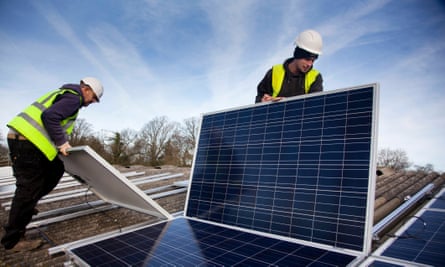‘We’re facing a critical shortage’: why UK’s green revolution urgently needs skilled workers
The country’s net zero transition may not be short of funds. But it desperately requires many more skilled engineers, electricians and workers than it has
In recent years, Britain has been busy setting up the scaffolding of the country’s future low-carbon economy. But beyond the Westminster pledges and white papers lies a very practical challenge: where are the workers who will bring the government’s green agenda to life?
Britain’s greatest industrial transformation since the Industrial Revolution will require a change on a similar scale: hundreds of thousands of jobs are expected to be created by the needs of a low-carbon economy. There are thousands of miles of cables to add to the national grid, electric car battery factories to build, heat pumps to install, and rising demand for wind and solar farms. Experts warn of a “critical shortage” of certified welders and electrical engineers, and fear that the government may have left it too late.
Ed Miliband, the shadow energy secretary, says Britain is facing a once-in-a-generation opportunity to rebuild the economy. But the prime minister is “asleep at the wheel”, he says, while the Tories are “happy to let jobs and wealth that could rebuild Britain go overseas instead”.
“Britain’s joiners, welders, engineers, technicians and construction workers are the people who are going to deliver a green future for this country,” Miliband says. “Yet under the Conservatives, far too many good jobs have gone overseas, as other countries get ahead in sectors like steel, electric car production, and clean energy.”

Analysts at the IPPR, a left-leaning thinktank, believe that as many as 1.6m new jobs could be created in the transition to a green economy. The looming skills gap is both a threat to the UK’s net zero ambitions and a big economic opportunity, according to Luke Murphy, an associate director at the IPPR.
“We’ve done exceptionally well on the rollout of offshore wind, for example,” he says. “But we’ve failed to capture the economic opportunity the way other countries have.”
The IPPR has found that the UK employs fewer people in renewable energy as a proportion of its working-age population than most other European countries. In wind, if the UK was performing as well as Denmark – home to offshore giant Ørsted – it could secure an additional 98,000 jobs, it believes. “Unless we have the industrial strategy and necessary skills in place to take advantage of the green transition, we risk missing our net zero targets, and failing to take advantage of the opportunity that lies ahead of us,” Murphy says. “The task ahead requires not only a net zero strategy but an industrial strategy alongside it.”
Forecasts for the number of jobs required to realise Britain’s low-carbon ambitions vary. The government’s official climate advisers at the Committee on Climate Change have estimated that between 135,000 and 725,000 net new jobs could be created by 2030 in low-carbon sectors such as generating renewable energy, upgrading buildings and manufacturing electric vehicles.
Welders and electrical engineers are in critically short supply, according to Phil Beach, the chief executive of Energy and Utility Skills, a trade association. He estimates that there are only “several hundred” certified welders currently in the UK but the country will need “several thousands” to get to net zero. There are similar concerns for the number of certified electrical engineers, who will be needed across the energy system.
“We need to train as many electricians as we can,” Beach says. “This decade we’re expected to lose 20% through retirements – so we’re already looking to find 275,000 roles to be filled this decade. “It can take two to three years to become fully qualified, so we’re facing a critical shortage.”
Ministers hope to increase Britain’s offshore wind capacity to 50 gigawatts by 2030, up from just over 10GW at present, and solar capacity fivefold by 2035. They also hope to build 24GW of nuclear power capacity by 2050, from just under 7GW at present. As a result, more than 600,000km of electric lines will need to be added or upgraded across the UK to connect these projects to the grid.

Meanwhile, in homes across the country, up to 600,000 heat pumps could replace gas boilers every year under government targets, and electric vehicle charging points are expected to appear along residential streets and motorways.
Each element of this plan requires thousands of skilled workers. There is a “massive shortage” of qualified heat pump engineers, according to Nesta, an innovation charity. The current number of accredited heat pump engineers is estimated to be about 3,000 but Britain will need at least 27,000 by 2028 to meet the government’s target.
At the same time, the number of people employed by the offshore wind industry will need to triple to just over 104,000 by 2030 to meet current targets, according to the Offshore Wind Industry Council. The Nuclear Industry Association has estimated power stations will require about 250,000 people, compared with their 77,000-strong workforce today.
“The truth is, we’re likely to run out of people before we run out of money for the green transition,” says Andy Lane, who leads BP’s carbon capture business in the UK. The oil company’s planned carbon capture project in Teesside is expected to create about 5,500 jobs and the company is working with local colleges to help offer apprenticeships in a bid to develop a pipeline of engineering talent and green skills.
The task of securing skilled workers had been largely regional in focus, according to Lane, who has also contributed to the government’s green jobs taskforce to help map out where skills are needed across the country.
“It’s important to remember that this is an opportunity. These are good, secure jobs that have value and a purpose. We need to communicate the positive case for these jobs and inspire a more diverse workforce,” says Lane. “Historically, this industry has been filled with white males – and that won’t work in the future.”
Labour has put forward a plan to make Britain a “green energy superpower” with a focus on delivering at least 500,000 skilled jobs across every region of the country. The plan includes a fund of £500m to provide capital grants to clean energy projects that win a government support contract and can prove that they will invest in building supply chains and jobs in Britain’s industrial heartlands.
The partyLabour’s green prosperity plan, says Miliband, will “rebuild this country with proper jobs and apprenticeships that are well paid, secure, and bring prosperity to families and communities”.
A government spokesperson said it had created 80,000 green jobs in the UK since 2020. “Our plan will attract £100bn of investment in green industries of the future and support 480,000 jobs by 2030. This will mean a stronger economy and more affordable transition to domestic energy. Labour’s reckless plans would take us back to square one, sending 200,000 British jobs abroad, sacrificing the communities and skills needed for the transition, with families paying the price for net zero.”
The government expects to set out an action plan for skilled jobs in the coming months. Will it be ambitious enough? “We’re being left behind,” says Murphy. “Much greater attention needs to be placed on jobs and skills, or it risks becoming a bottleneck to the energy transition.”
Well, 2023 didn’t exactly go to plan, did it?
Here in the UK, the prime minister, Rishi Sunak, had promised us a government of stability and competence – not forgetting professionalism, integrity and accountability – after the rollercoaster ride of Boris Johnson and Liz Truss. Remember Liz? These days she seems like a long forgotten comedy act. Instead, Sunak took us even further through the looking-glass into the Conservative psychodrama.
Elsewhere, the picture has been no better. In the US, Donald Trump is now many people’s favourite to become president again. In Ukraine, the war has dragged on with no end in sight. The danger of the rest of the world getting battle fatigue and losing interest all too apparent. Then there is the war in the Middle East and not forgetting the climate crisis …
But a new year brings new hope. There are elections in many countries, including the UK and the US. We have to believe in change. That something better is possible. The Guardian will continue to cover events from all over the world and our reporting now feels especially important. But running a news gathering organisation doesn’t come cheap.
So this year, I am asking you – if you can afford it – to give money. Well, not to me personally – though you can if you like – but to the Guardian. The average monthly support in India is around $4, however much you give, all that matters is you’re choosing to support open, independent journalism.
With your help, we can make our journalism free to everyone. You won’t ever find any of our news reports or comment pieces tucked away behind a paywall. We couldn’t do this without you. Unlike our politicians, when we say we are in this together we mean it.
Source ; https://www.theguardian.com/environment/2024/jan/20/were-facing-a-critical-shortage-why-uks-green-revolution-urgently-needs-skilled-workers

